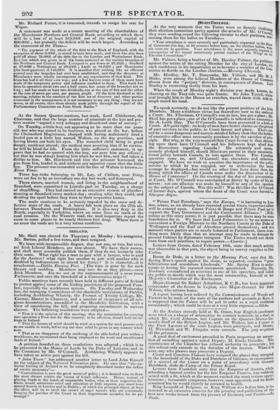IRELAND.
Mr. Shed was elected for Tipperary on Monday : his antagonist, 31r. Barton, polled a few votes, and then resigned.
We learn with inexpressible disgust, that not one, or two, but seve- ral Irish Liberal Members, are now absent. We have their names, and shall most assuredly publish them, if they do not instantly take their seats. What right has a man to pair with a lawyer, who is paid for the Assizes ? what right has another to pair with another who is disabled by indisposition to attend his ditties ? It is shameful—it is treacherous.—Dublin Evening Post. [The time is gone by for such threats and scolding. Members may now do as they please—even Irish Members. Are we not at the commencement of a seven years Parliament, and over the threshold of a Conservative reign ?1
Public meetings have recently been held in different parts of Ireland to protest against some of the leading provisions of the proposed Poor. law, especially the workhouse system. On Tuesday and Wednesday last, the managing Committees of the charitable institutions of Dublin, including Archbishop Whately, the Provost of Trinity College, Mr. Connor, Master in Chancery, and a number of clergymen of all reli- gious denominations, assembled in the Mendicity Institution, with a view of considering the bill, and proposing amendments in various clauses. The following resolutions were adopted-
" That it is the opinion of this meeting, that the commission for carrying into operation a Poor-law for this country, to be effective, should hold its sit- tings in Ireland.
" That the houses of relief should he tried as a system for such persons only as are unable to work, before any out-door relief be given in any manner what- ever.
44 That as we disapprove of the confining of the able-bodied poor within a workhouse, we recommend their being employed on the waste and uncultivated lands of Ireland."
A petition founded on these resolutions was adopted ; which is to be presented in the House of Lords by the Duke of Leinster, and in the Commons by Mr. O'Connell. /archbishop Whately appears to Lave taken an active part against the bill.
" John Tuam " has addressed another letter to Lord John Russell on the subject of the National Education plan. He says that "the na- tional feeling of Ireland is to be completely drenched under the influx of exotic measures"—
" Centralisation is now the great secret of policy ; it is deemed wise to draw
the most distant within the vortex of Court influence. Hence, instead of placing funds in the hands of responsible bodies, who, in their respective dis- tricts, would administer relief and education at little expense, you must have central boards in London and in Dublin; of which the principal object, at least the effect, will be to swell the crowd of eager suitors who are continually bsieging the porches of the Court in their importunate scramble for its pa. tronage."


























 Previous page
Previous page